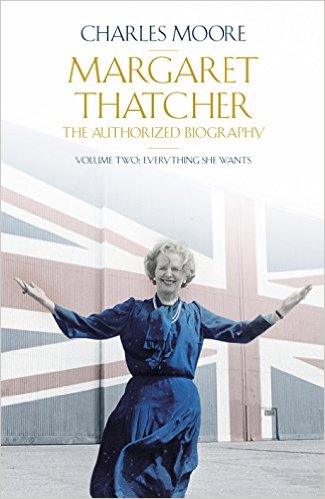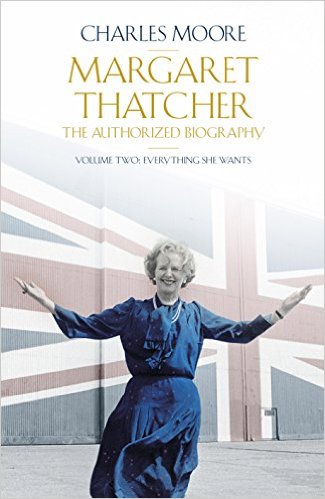
Finest Hour 172
Books, Arts, & Curiosities – The Iron Lady

June 12, 2016
Finest Hour 172, Spring 2016
Page 43
Review by John Campbell
Charles Moore, Margaret Thatcher: The Authorized Biography. Volume Two: Everything She Wants, Allen Lane, 821 pages, £30. ISBN 978-0713992885
 Just three years after her death, Margaret Thatcher ranks second only to Churchill as the towering figure of twentieth-century Britain. The second instalment of Charles Moore’s monumental official biography—now projected to take three volumes—is very different from the first, but equally good. This one covers just five years—the central five years of her decade in power—so that it deals almost entirely with the business of government, since Mrs Thatcher had no other interests and allowed herself virtually no time off. This middle chunk of her life could easily have been a shapeless chronicle of events. That it is not, but grips the attention for 700 pages, is due to three things: the historic scale of the issues she had to deal with, Moore’s skill in drawing together a truly enormous range of public and private sources, and the hyperactive and commanding personality of the Prime Minister herself.
Just three years after her death, Margaret Thatcher ranks second only to Churchill as the towering figure of twentieth-century Britain. The second instalment of Charles Moore’s monumental official biography—now projected to take three volumes—is very different from the first, but equally good. This one covers just five years—the central five years of her decade in power—so that it deals almost entirely with the business of government, since Mrs Thatcher had no other interests and allowed herself virtually no time off. This middle chunk of her life could easily have been a shapeless chronicle of events. That it is not, but grips the attention for 700 pages, is due to three things: the historic scale of the issues she had to deal with, Moore’s skill in drawing together a truly enormous range of public and private sources, and the hyperactive and commanding personality of the Prime Minister herself.
With the luxury of hindsight these years were the high noon of Thatcherism when the Iron Lady, triumphantly re-elected on the back of military victory in the Falklands war, transformed the British economy by selling back to private enterprise most of the public utilities nationalised by the Labour government after 1945—notably telephones, gas, electricity, and British Airways—opening up the London financial market to global competition, cutting taxes, and facing down the challenge of the militant trade unions, greatly assisted by a divided opposition and cushioned by the bonus of North Sea oil, before cruising to another landslide majority and an unprecedented third term in 1987.
At the time, however, it did not feel so easy. Privatisation was less the carefully planned rolling-out of an ideological programme than a series of risky ad hoc expedients, which flunked the opportunity to introduce more competition. Unemployment remained shockingly high, while the crucial confrontation with the coal-miners turned into a violent and divisive year-long confrontation, which could easily have ended in defeat for the government if the miners’ leader, Arthur Scargill, had played his cards less crassly. Irish republicans came close to assassinating the Prime Minister with a massive bomb planted in her hotel at the Tory party conference in 1985; and a trivial turf war over a small helicopter company blew up into a crisis of trust which very nearly brought her down in 1986.
Nevertheless, she was emerging as a major player on the international stage, where by 1983 she was already the longest-serving leader among the G7 nations. While consolidating the close political and personal alliance she had already forged with Ronald Reagan, she simultaneously developed a combative but fruitful relationship with the new Soviet leader Mikhail Gorbachev, thereby helping to broker the nuclear disarmament talks which eventually—after some alarm when she thought Reagan was willing to bargain away Britain’s nuclear deterrent—enabled the West’s bloodless victory in the Cold War.

2024 International Churchill Conference
The main outline of all these big stories was already known from previous biographies and memoirs. Compared with his first volume, where Moore had access to genuinely new material about Margaret Roberts’ early life, there is surprisingly little in this second volume that is really revelatory. What gives his account its fascination and authority is the exceptional level of vivid detail about the processes of diplomacy and decision-making that his status as the official biographer has enabled him to deploy.
The portrait that emerges is not wholly admirable. Her treatment of colleagues was often appalling, making it easy to see why they eventually threw her out: she could be maddening, stubborn, unreasonable, and contradictory. But against that, her clarity of purpose, her ability to combine broad vision with mastery of detail, her work rate, and her unswerving dedication to the job as she saw it are nothing short of mind-boggling, and Moore’s meticulously constructed narrative—admiring but not uncritical—does her qualities full justice. If anything is lacking, it is any recognition of the downside of her legacy—notably the ever-widening gulf of inequality that increasingly disfigures British (as it does American) society: but maybe that is a subject for his concluding volume. The more she recedes into history, however, the more phenomenal Margaret Thatcher appears, compared with her bland successors– or indeed most of her predecessors. Charles Moore’s eagerly awaited third volume will complete a great biography of an exceptional life.
John Campbell is the author of The Iron Lady: Margaret Thatcher, from Grocer’s Daughter to Prime Minister (Penguin 2009). The full-length version of this review appears in the February 2016 edition of the Chartwell Bulletin. His study of Aneurin Bevan starts on page 20 in this issue of Finest Hour.
Subscribe
WANT MORE?
Get the Churchill Bulletin delivered to your inbox once a month.


